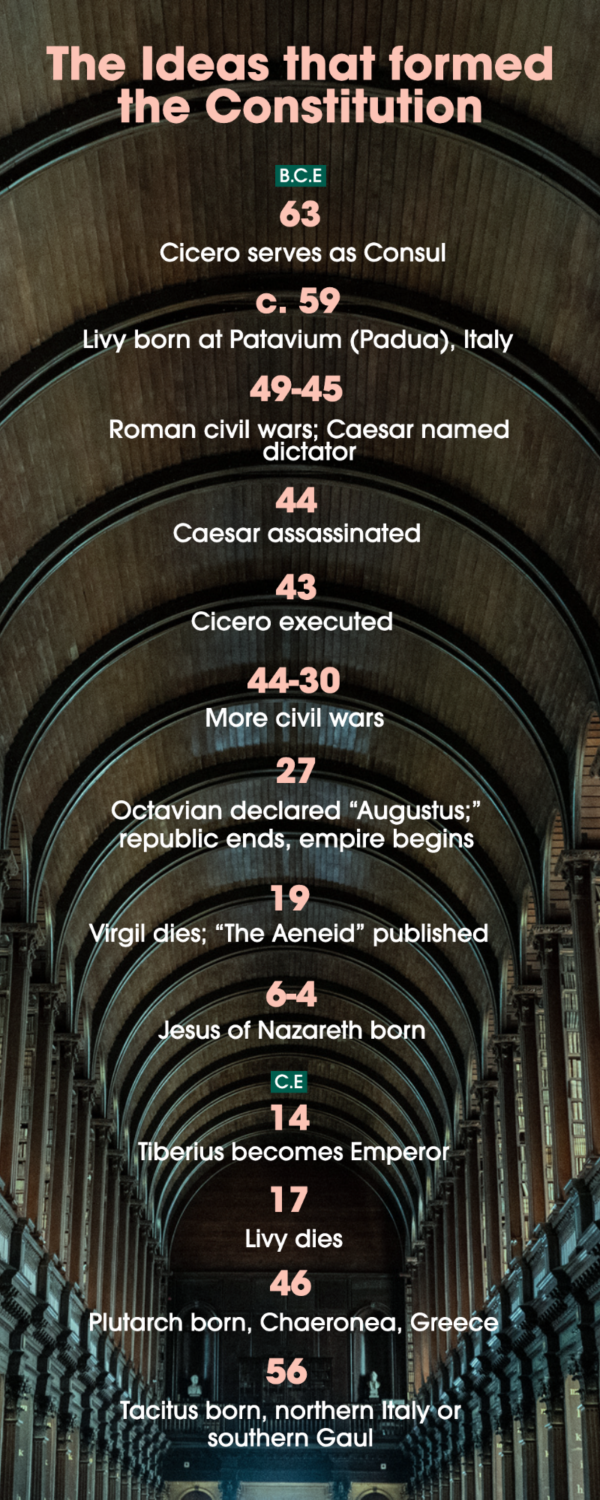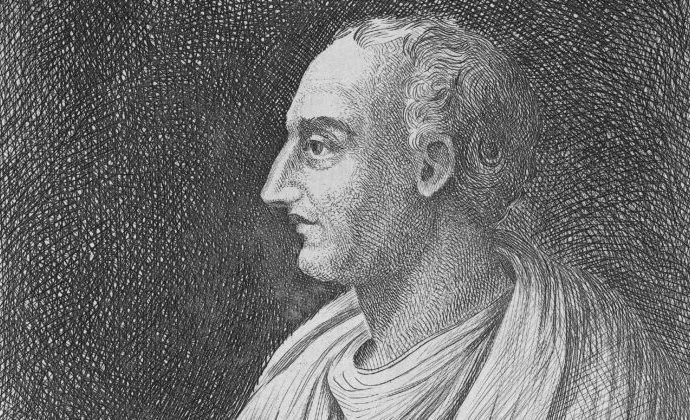This essay was first published in the Dec. 31, 2022 Epoch Times.
The two previous essays (here and here) observed that the final years of the Roman Republic and the first years of the Roman Empire produced some outstanding poets. This period produced some outstanding historians as well. The one with the most impact on the American constitution-makers was Titius Livius, whom English speakers call “Livy.”
Like Cicero and Virgil, Livy hailed from a provincial Italian town. He was born either in 59 or 64 B.C.E. in Patavium (Padua), about 25 miles east of Venice. Unlike Cicero—but like Virgil—Livy didn’t pursue a military or political career. He spent his entire life as a scholar. (Essay continues after time line.)
 Livy’s life-work was his history of Rome, entitled “Ab Urbe Condita” (“From the Founding of the City”). For most of his career he resided in the capital, so he could be near libraries with historical records. When he died in 17 C.E., however, he was back in his hometown.
Livy’s life-work was his history of Rome, entitled “Ab Urbe Condita” (“From the Founding of the City”). For most of his career he resided in the capital, so he could be near libraries with historical records. When he died in 17 C.E., however, he was back in his hometown.
“Ab Urbe Condita” covered a period of over 700 years and sprawled across 142 “books” (papyrus scrolls). Only Books 1–10 and 21–45 have survived in their entirety. For the rest, we have only summaries by other authors and fragments of the original work.
As a historian, Livy suffered two weaknesses. First, he didn’t have the kind of political connections Polybius enjoyed. That meant that Livy’s access to archives, documents, and witnesses wasn’t as good. Second, unlike Xenophon and Polybius, Livy had no direct exposure to politics or war. So when describing military or political events he sometimes committed mistakes more experienced historians wouldn’t have made. Of course, most modern academic historians share the same disadvantage.
But Livy’s history also shows some real strengths: its wide scope, the care with which it was executed, and the beauty of the prose. Further, unlike most modern academic historians, Livy didn’t depend, directly or indirectly, on government funding, so he didn’t share modern academic historians’ systemic bias. On the contrary, much of Livy’s work was inherently critical of Rome’s new imperial regime. For reasons of prudence, he delayed publishing a few portions, but ultimately he published all of it.
Livy and the Founding Generation
During the Founding era, it was common to read portions of Livy’s history in grammar school. Patrick Henry, who was educated in the classics by his father, read at least part of Livy’s history in Latin at age 15.
As adults, many of the Founders remained devoted to Livy. Henry re-read “Ab Urbe Condita” (in translation) annually. John Jay participated in a formal debate on an issue derived from Livy’s history: “Was Virginius Morally Justified in Putting His Daughter Virginia to Death?” (Jay was assigned to argue the affirmative.) John Dickinson relied on Livy in arguing the colonists’ case against the government in London. And during the ratification debate, an anonymous essayist—probably John Francis Mercer of Maryland—opined that “Thucydides, Polybius and Livy surpass all who have followed them in history.”
Why did the Founders admire Livy? Several reasons. One was that Livy, like so many of the Founders, idealized agricultural life and republican government.
Another was the quality of his rhetoric. Like all ancient historians, he inserted fictional speeches into his work, and some Founders, such as Thomas Jefferson, consulted those orations to improve their own writing.
Moreover, Livy’s history is crammed with stories of republican heroes: men and women who displayed courage and virtue when faced with oppression, danger, and other challenges. These stories encouraged the Founders to surmount their own difficulties. Livy’s heroic characters were models for the Founders to emulate.
For example, Livy related how the statesman Cincinnatus left his plow to save the Roman republic from military defeat. He told the tale of how Fabius waged successful guerrilla warfare against Hannibal. Thus, when some Americans tagged George Washington “the American Cincinnatus” and others called him “the American Fabius,” those were high compliments indeed.
The Founders also were attracted to Livy because he explained history in moral terms. In his narrative, events unfold as they do largely because of the moral qualities of the central actors. This isn’t a thoroughly accurate way to approach history, but it was appealing to people steeped in biblical morality.
Livy in the Constitutional Debates
Several participants in the constitutional debates of 1787–1790 drew on Livy’s “Ab Urbe Condita” for political and constitutional lessons.
In the first volume of his survey of republican governments—which circulated at the Constitutional Convention—John Adams relied on it to support his case for the rule of law. He similarly relied on it when arguing for a “mixed constitution” that distributed power to monarchical, aristocratic, and democratic institutions, and then balanced each against the others.
During the ratification debates, the young Noah Webster of Connecticut—later famous for his dictionary—published a lengthy pamphlet endorsing the Constitution. It was entitled “An Examination into the Leading Principles of the Federal Constitution Proposed by the Late Convention.” Webster argued that the Constitution would secure property ownership, which, in turn, would encourage stability. It would encourage stability because political power tends to follow the ownership of property. Webster drew on Livy’s work to support the latter proposition.
On the other hand, a New York Antifederalist writing under the name of “Rusticus” used an episode from “Ab Urbe Condita” to make the case against ratification. Here’s the background:
At the time, most state legislative bodies were elected annually. A common saying was, “Where annual elections end, tyranny begins.” But the Constitution didn’t provide for annual elections. This was one reason the Antifederalists opposed it.
Further, some Antifederalists—particularly in Massachusetts and New York—thought the Constitutional Convention had betrayed its trust by proposing a new form of government instead of merely offering amendments to the Articles of Confederation. (This charge actually wasn’t true.)
“Rusticus” quoted Livy’s version of a speech by a Roman senator named Marcus Horatius Barbatus. The speech assailed the infamous decemviri—a board of 10 men appointed only to codify the laws, but who had seized tyrannical power. “Rusticus’s” translation is clumsy, so here is Aubrey de Sélincourt’s rendering of part of Barbatus’s speech:
“The real war which the people of Rome must fight … is a war against those who, appointed to office in order to give us laws, have left their country at the mercy of their own caprice; it is against those who have abolished free elections, annual magistracies, which, by assuring the regular transference of power, are the sole guarantee of liberty for all, and, without any mandate from the people, flaunt the insignia, and exercise the power, of kings.”
One can envision Founding-era schoolboys declaiming these lines in passionate Latin. “Rusticus” used them to accuse the Constitutional Convention of trying to abolish annual elections, exceeding its power, and “flaunt[ing] the insignia … of kings!”
The Next Installment
During the constitutional debates, many essayists wrote under classical pseudonyms such as “Publius,” “Cato,” and “Timoleon” rather than under their own names. Have you wondered why they chose the names they did? The next installment answers that question.
Answering Other Questions …
Two more questions have arisen on this series, both of which contain implicit criticism: First, why am I covering the influence on the Constitution of so many authors but not the influence of religion and the Bible? And, second, why am I using the academic date notations “B.C.E.” and “C.E.” instead of the Christian ones (“B.C.” and “A.D.”)?
Those questions were answered in the first and second installments. Prior installments may be accessed through the links at the end of each essay.
Read prior installments here: first, second, third, fourth, fifth, sixth, seventh, eighth, ninth, and tenth.









